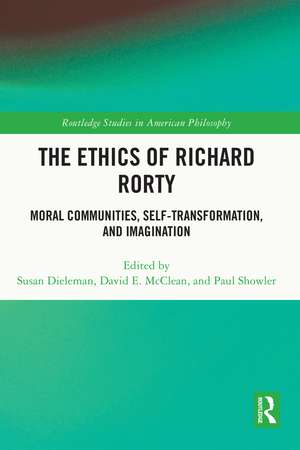The Ethics of Richard Rorty: Moral Communities, Self-Transformation, and Imagination: Routledge Studies in American Philosophy
Editat de Susan Dieleman, David E. McClean, Paul Showleren Limba Engleză Hardback – 6 mai 2022
Several contributors address the ethical implications of Rorty’s commitment to a vision of political liberalism without philosophical foundations. Others offer critical examinations of Rorty’s claim that our private or individual projects of self-creation can or should be held apart from our public goals of ameliorating social conditions and reducing cruelty and suffering. Some contributors explore hurdles that impede the practical applications of certain of Rorty's ideas.
The Ethics of Richard Rorty will appeal to scholars and advanced students interested in American philosophy and ethics.
| Toate formatele și edițiile | Preț | Express |
|---|---|---|
| Paperback (1) | 389.07 lei 6-8 săpt. | |
| Taylor & Francis – 26 aug 2024 | 389.07 lei 6-8 săpt. | |
| Hardback (1) | 1000.27 lei 6-8 săpt. | |
| Taylor & Francis – 6 mai 2022 | 1000.27 lei 6-8 săpt. |
Din seria Routledge Studies in American Philosophy
-
 Preț: 327.46 lei
Preț: 327.46 lei -
 Preț: 311.59 lei
Preț: 311.59 lei -
 Preț: 296.68 lei
Preț: 296.68 lei -
 Preț: 345.64 lei
Preț: 345.64 lei -
 Preț: 309.93 lei
Preț: 309.93 lei -
 Preț: 389.66 lei
Preț: 389.66 lei -
 Preț: 384.86 lei
Preț: 384.86 lei -
 Preț: 388.72 lei
Preț: 388.72 lei -
 Preț: 381.00 lei
Preț: 381.00 lei - 18%
 Preț: 1002.36 lei
Preț: 1002.36 lei - 18%
 Preț: 1000.27 lei
Preț: 1000.27 lei -
 Preț: 385.71 lei
Preț: 385.71 lei -
 Preț: 383.42 lei
Preț: 383.42 lei - 18%
 Preț: 893.90 lei
Preț: 893.90 lei - 18%
 Preț: 1001.27 lei
Preț: 1001.27 lei - 21%
 Preț: 258.15 lei
Preț: 258.15 lei - 18%
 Preț: 1109.18 lei
Preț: 1109.18 lei - 18%
 Preț: 997.77 lei
Preț: 997.77 lei - 18%
 Preț: 1000.45 lei
Preț: 1000.45 lei -
 Preț: 386.81 lei
Preț: 386.81 lei - 18%
 Preț: 1108.37 lei
Preț: 1108.37 lei - 18%
 Preț: 995.54 lei
Preț: 995.54 lei - 18%
 Preț: 1111.58 lei
Preț: 1111.58 lei - 18%
 Preț: 1006.60 lei
Preț: 1006.60 lei -
 Preț: 388.68 lei
Preț: 388.68 lei - 17%
 Preț: 259.98 lei
Preț: 259.98 lei -
 Preț: 384.86 lei
Preț: 384.86 lei - 5%
 Preț: 365.61 lei
Preț: 365.61 lei - 18%
 Preț: 992.38 lei
Preț: 992.38 lei - 26%
 Preț: 819.90 lei
Preț: 819.90 lei -
 Preț: 389.66 lei
Preț: 389.66 lei - 16%
 Preț: 314.24 lei
Preț: 314.24 lei - 18%
 Preț: 1055.51 lei
Preț: 1055.51 lei
Preț: 1000.27 lei
Preț vechi: 1219.84 lei
-18% Nou
Puncte Express: 1500
Preț estimativ în valută:
191.40€ • 200.37$ • 158.37£
191.40€ • 200.37$ • 158.37£
Carte tipărită la comandă
Livrare economică 05-19 aprilie
Preluare comenzi: 021 569.72.76
Specificații
ISBN-13: 9781032074894
ISBN-10: 1032074892
Pagini: 238
Dimensiuni: 152 x 229 x 14 mm
Greutate: 0.45 kg
Ediția:1
Editura: Taylor & Francis
Colecția Routledge
Seria Routledge Studies in American Philosophy
Locul publicării:Oxford, United Kingdom
ISBN-10: 1032074892
Pagini: 238
Dimensiuni: 152 x 229 x 14 mm
Greutate: 0.45 kg
Ediția:1
Editura: Taylor & Francis
Colecția Routledge
Seria Routledge Studies in American Philosophy
Locul publicării:Oxford, United Kingdom
Public țintă
Postgraduate and Undergraduate AdvancedCuprins
Introduction: Stretched Thin: Rorty’s Ethical Vision 1. Reading Rorty in Tehran 2. Self-Creation and Community 3. Richard Rorty, Ethnocentrism, and Moral Community 4. Rorty's Hope of Achieving a Global Civilization 5. Imagination as a Social Virtue 6. Can Trees Care? 7. Richard Rorty on the "Too Sane" 8. Scientific Method and Moral Virtue 9. Talking with the Better-Looking Animals 10. Rortyan Ethics 11. When is Desire Dangerous? 12. Speaking for Oneself 13. Pragmatism and the Tragic Sense of Death 14. The Importance of Words 15. The Ironic and Liberal Deficit in Rorty’s Irony
Notă biografică
Susan Dieleman is Assistant Professor of Philosophy at Southern Illinois University Edwardsville, USA. She is the coeditor of Pragmatism and Justice (2017) and of the Conference Proceedings for the 2017 meeting of the Richard Rorty Society (2019). She is also coeditor of the entry on Richard Rorty for the Stanford Encyclopedia of Philosophy.
David E. McClean is a Senior Lecturer in Philosophy and Business and Professional Ethics at Rutgers University, Newark, USA. He is the editor of The Integrated Ethics Reader: Reconnecting Thought, Emotion, and Reverence in a World on the Brink (2020) and Understanding and Combating Global Corruptions: A Reader (2021). He is the author of Wall Street, Reforming the Unreformable: An Ethical Perspective (Routledge, 2015) and Richard Rorty, Liberalism, and Cosmopolitanism (Routledge, 2014).
Paul Showler is a PhD candidate in the Department of Philosophy at the University of Oregon, USA. His dissertation draws from recent work in pragmatism and philosophical genealogy to develop and defend a new approach for thinking about moral status.
David E. McClean is a Senior Lecturer in Philosophy and Business and Professional Ethics at Rutgers University, Newark, USA. He is the editor of The Integrated Ethics Reader: Reconnecting Thought, Emotion, and Reverence in a World on the Brink (2020) and Understanding and Combating Global Corruptions: A Reader (2021). He is the author of Wall Street, Reforming the Unreformable: An Ethical Perspective (Routledge, 2015) and Richard Rorty, Liberalism, and Cosmopolitanism (Routledge, 2014).
Paul Showler is a PhD candidate in the Department of Philosophy at the University of Oregon, USA. His dissertation draws from recent work in pragmatism and philosophical genealogy to develop and defend a new approach for thinking about moral status.
Descriere
This book demonstrates that Rorty offers a coherent ethical vision. Its chapters explore his emphasis on the importance of moral imagination, social relations, language, and literature as instrumental for ethical self-transformation as well as for strengthening social hope, which entails work toward a more inclusive and cosmopolitan world.
